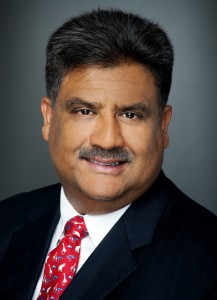 November 5, 2015 – AKFC sat down with the CEO of Afghanistan’s leading telecommunications provider, Roshan, to discuss the importance of connecting communities in Afghanistan. Karim Khoja, a proud Canadian, has over 25 years of experience in the telecommunications industry, spanning five countries (Afghanistan, Croatia, Pakistan, Poland and Tajikistan). In October 2015, he was named ‘Executive of the Year’ at the 12th Annual International Business Awards in Toronto.
November 5, 2015 – AKFC sat down with the CEO of Afghanistan’s leading telecommunications provider, Roshan, to discuss the importance of connecting communities in Afghanistan. Karim Khoja, a proud Canadian, has over 25 years of experience in the telecommunications industry, spanning five countries (Afghanistan, Croatia, Pakistan, Poland and Tajikistan). In October 2015, he was named ‘Executive of the Year’ at the 12th Annual International Business Awards in Toronto.
For more than a decade, Khoja has dedicated his time to the Aga Khan Fund for Economic Development (AKFED) to bring competition and best practices to the telecommunication industry in Afghanistan and Tajikistan. He has focused not only on financial results, but also on how technology can be used to change lives.
Five Questions with Karim Khoja
1. Roshan was established in Afghanistan in 2003 at a time when the country was fragile. Looking back, how did you know that telecommunications could play such a powerful and transformative role in Afghanistan?
It was a case of supply and demand. Afghans wanted to be connected to each other and the rest of the world, yet in 2003, only 50,000 had access to a phone and many had to walk to another country just to make a call. Thirty years of war had destroyed infrastructure, fostered corruption, created chronic security risks and left the majority of the population in abject poverty. Despite these obstacles, we knew that if Afghans could communicate with each other then they wouldn’t fight.
Under guidance from AKFED, we entered Afghanistan believing that we could harness the power of mobile technology to catalyze reconstruction and economic development, and tap in to the reservoir of the country’s human potential. The metrics have proved that we were right to believe – almost 90 per cent of the Afghan population now has access to a phone. The telecommunications sector has invested approximately $2.5 billion into Afghanistan and has developed products and services that link education, healthcare, business, and technology to support Afghan youth as they develop into the leaders of the future.
2. How did Roshan establish itself at a time when security risks were high in Afghanistan?
Actually, the security situation was more manageable back when Roshan was first established than it is now. As we were providing an essential service that was helping to transform the lives of Afghans from all backgrounds, we were largely unencumbered by security threats. Unfortunately, the security situation today is highly volatile, and with international forces leaving the country there have been increased incidents of violence. However, we believe that security and social and economic development go hand in hand – Roshan and other private sector organizations have invested heavily in Afghanistan’s infrastructure with the aim of bringing security to the country, and we will continue to do so.
3. Corporate social responsibility (CSR) is a big part of your work in Afghanistan. What CSR initiative are you most proud of and why?
I am most proud of Roshan’s Telemedicine initiative, which has filled a huge gap in Afghanistan’s decimated healthcare infrastructure and also aligns with our business model of connecting social contribution with commercial success, to drive socio-economic development in Afghanistan’s key sectors and civil society. Telemedicine utilizes mobile technology to link the country’s rural hospitals to medical centres of excellence, such as the Aga Khan University Hospital in Karachi, Pakistan. This technology has enabled Afghan doctors in remote parts of the country to diagnose and perform surgeries using the Telemedicine link. In the last eight years, more than 14,000 patients from across Afghanistan have received treatment and diagnosis through Telemedicine and more than 4,000 healthcare providers have been trained.
4. Running Afghanistan’s largest telecommunications company is no easy task. What inspires you to keep going every day?
My inspiration to keep going comes from 1) His Highness the Aga Khan’s belief that you can always do more; and 2) the amazingly talented team I have supporting me at Roshan.
5. Roshan now has over six million subscribers and has made several investments in health, education and gender equality. What’s next for Roshan in Afghanistan?
We want to build our own fibre optic network to vastly increase broadband internet access in Afghanistan. Liberalizing the fibre market is critical to creating a new wave of telecoms growth, to complement the voice surge of the past decade. Roshan’s fibre optic technology would open up a whole world of new applications and services for Afghans, and transform the country in the same way we did with voice services in 2003.
Related Resources:
- Watch a webcast featuring Karim Khoja and May Jeong, an award-winning journalist based in Kabul, Afghanistan (coming soon)
